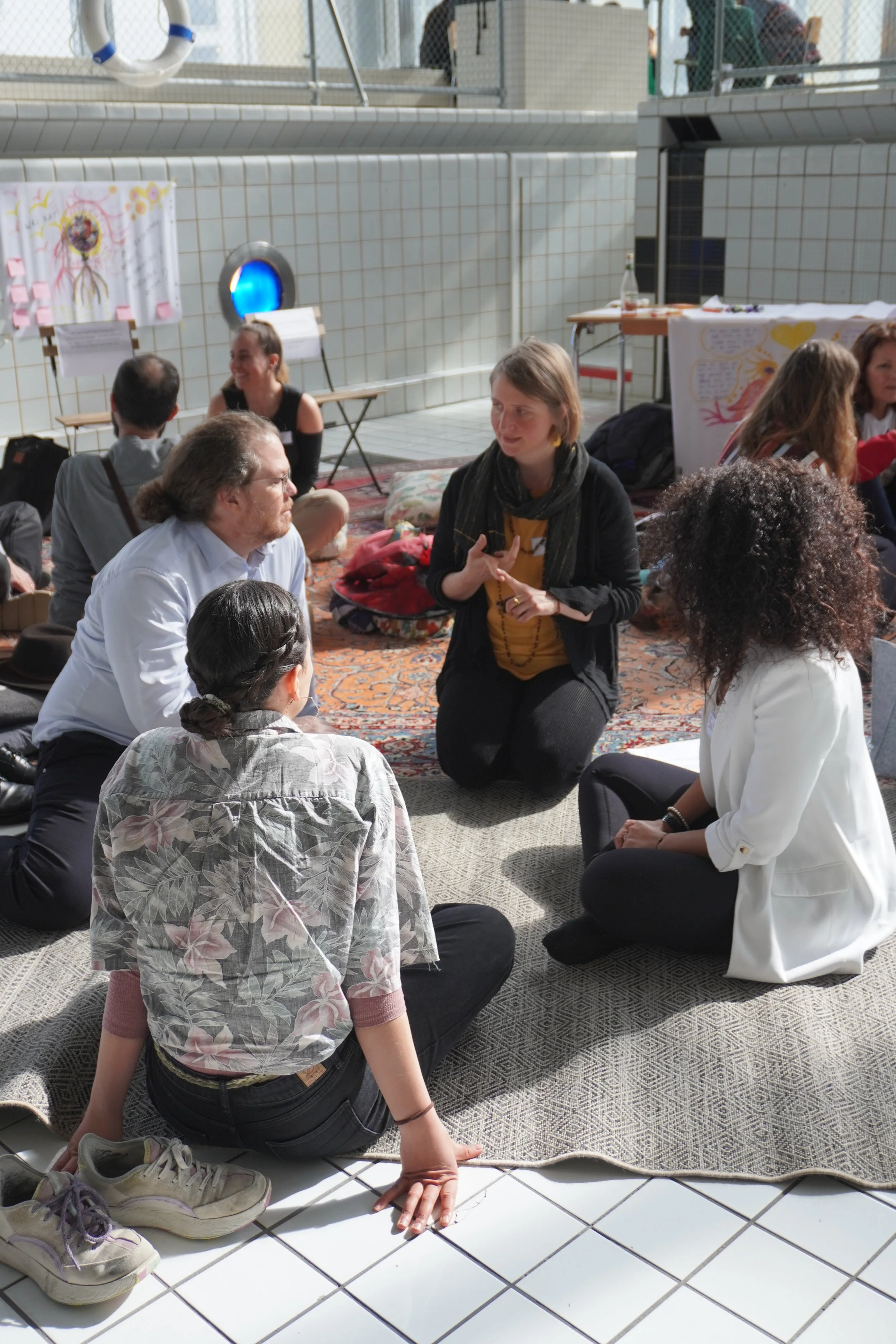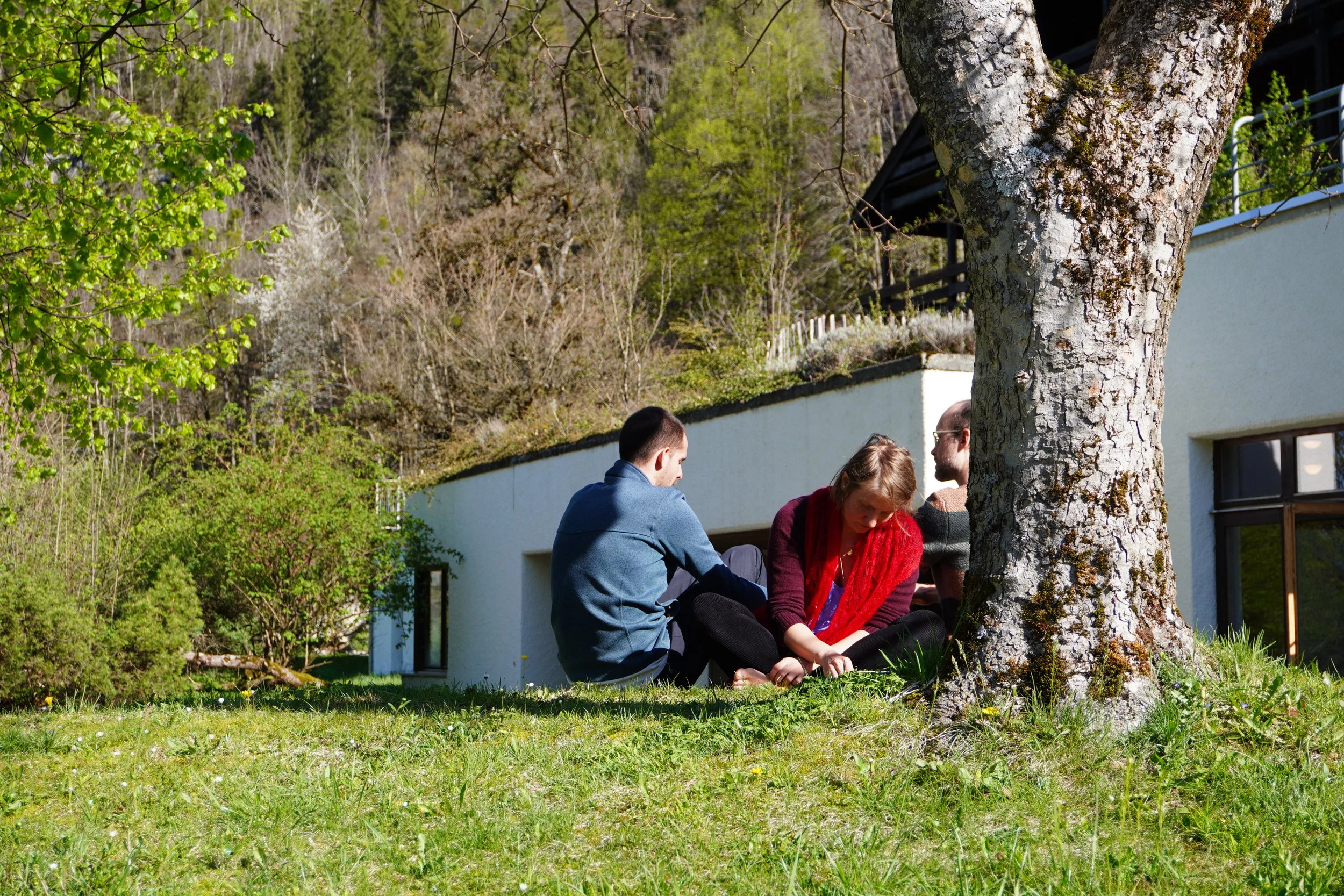The 5 Faces of Intuition: Reclaiming Inner Wisdom for Personal and Planetary Healing
Are you interested in cultivating your intuition through diverse practices?
Starting November 4, 2024, we offer a new 5-week workshop on Embodied Ways of Knowing. Join us!
In this blog post, Catalyst and facilitator Alexandra Choutko explores the importance of cultivating intuition to face the challenges of our time.
As we confront planetary boundaries, ecological degradation, and rising social inequalities, it becomes clear that conventional approaches – rooted in analysing sub-problems rather than looking at the whole – are falling short. These challenges require us to access new ways of knowing. Otto Scharmer in Theory U identifies three divides that are central to our current challenges: the ecological divide (our separation from nature), the social divide (our disconnect from each other), and the spiritual divide (our disconnection from ourselves). Intuition is a skill we can learn to cultivate: it can help bridge these divides by allowing us to reconnect to ourselves and the world around us.
Charles Eisenstein, in The More Beautiful World Our Hearts Know is Possible (2013), points out that our capitalist and hierarchical systems often stifle our intuitive capacities, disconnect us from ourselves and the natural world and push us into a constant pursuit of productivity and external validation. Therefore, it can be argued that reclaiming intuition is not just a personal endeavour but a collective one: We needa way of healing the divides at the root of most of our time’s issues.
Daniel Kahneman, in Thinking, Fast and Slow (2011), highlights the interplay between intuitive, fast, and deliberate rational thinking. We need both – intuition for sensing what’s emerging, and rationality for structuring it into actionable steps.
The Five Faces of Intuition
The following passage explores five distinct ways of understanding and experiencing intuition, each offering unique ways to engage with ourselves, each other, and the planet.
1. Embodied Wisdom: Listening to the Body
Embodied Wisdom reflects the body’s capacity to process information faster than the rational mind, often manifesting as a gut feeling, a physical sensation or a movement that wants to arise.
Somatic approaches, as explored in The Body Keeps the Score by Bessel van der Kolk (2014) and Somatic Experiencing by Peter Levine, show how trauma and emotion are stored in the body and can be brought up to the surface to be processed and surpassed.
2. Emotional Intuition: Learning Through Feeling
Emotional Intuition is the ability to understand the world through our emotions. Our emotional responses carry a wealth of information about the world around us, even when we cannot rationally explain them. This idea overlaps with Nora Bateson’s concept of Symmathesy, which refers to learning within interconnected systems. In this framework, knowledge is co-created through dynamic relationships among all participants in the system. In this process, emotions play a role as feedback mechanisms, reflecting the state of our inner and outer environments. Symmathesy, therefore, emphasises the fluid, co-evolving nature of knowledge, where feedback from emotions and other signals helps inform and shape the ongoing learning process within complex, interconnected systems.
3. Inner Knowing: The Wisdom from Within
Inner Knowing refers to the deep, often inexplicable sense of certainty within us. We cannot easily explain or justify it, yet it feels undeniably true. This type of intuition arises from a state of stillness and presence, where thoughts are suspended and we can access a wisdom that feels undeniable, even if it’s hard to explain. Eckhart Tolle’s The Power of Now (1997) describes how, by quieting the mind and entering the present moment, we open ourselves to a deeper source of knowledge that transcends rational thought.
Inner knowing is particularly relevant in times of crisis or decision-making when data and external input overwhelm us. By tuning into this deeper sense of certainty, we can bypass the noise of external opinions and trust our inner compass.
4. Subtle Perception: Sensing the Invisible Threads
Subtle Perception refers to the ability to sense unseen connections and patterns, picking up on rhythms that the rational mind might miss. In many Indigenous traditions, there is a deep reverence for this form of perception, practised through listening to the natural environment and the community. Cultivating subtle perception offers a way to reestablish our relationship with the earth and with one another. Joanna Macy’s framework The Work That Reconnects emphasises the interconnectedness of personal, social, and ecological systems, encouraging individuals to reconnect with the rhythms of the Earth and their role within it.
Intuition plays a key role in helping people attune to these larger systems, guiding them beyond personal experience and fostering a collective, ecological awareness.
5. Sensing into the Collective: Tapping into Shared Wisdom
When we tap into group flow or collective consciousness, we access shared wisdom that transcends individual knowledge. Thomas Hübl’s work on collective trauma (such as Attuned,2023, and Collective Trauma, 2020) and Otto Scharmer’s Theory U emphasise the importance of tuning into the collective field to access insights that emerge from interconnectedness.
This form of intuition is particularly important when addressing global challenges that require cooperation, collective action, and systems thinking. By attuning ourselves to the collective field, we can co-create solutions that align with the needs of the whole, rather than just individual interests.
Play: A Catalyst for Intuition
While play is not a form of intuition per se, it is a powerful tool for cultivating intuitive abilities across all dimensions. Engaging in play can facilitate flow states, such as being fully immersed in an activity and losing track of time and self-consciousness. In their book Stealing Fire (2017), Steven Kotler and Jamie Wheal highlight how flow allows individuals to access heightened creativity and performance by temporarily shutting off a type of thinking. By bypassing over-analysis and rational thought, we can tap into deeper wisdom and insights.
Play is also essential for fostering collective flow, where teams and communities can synchronise and collaborate intuitively. Companies like Google and IDEO have integrated playful practices into their work cultures, leading to significant innovation and success.
Five Further Catalysts for Intuition
By incorporating play into our daily lives we create conditions for intuition to thrive.
Many further pactices can help us to deepen the connection to ourselves, our bodies, our emotions and the people and systems around us:
Movement: Physical activities like dance, tap into embodied wisdom and activate intuition through bodily awareness. Movement can lead to flow states, enhancing intuitive clarity.
Creation of Art: Artistic expression channels subconscious wisdom. Whether painting, writing, or crafting, the creative process bypasses analytical barriers, revealing hidden truths and insights.
Stillness and Meditation: Quieting the mind through meditation fosters deep listening, allowing intuitive insights to emerge.
Journaling: Free writing allows thoughts to flow without judgment, uncovering subconscious patterns and insights.
Connection to Nature: Spending time in nature reawakens ecological intuition, helping us sense our interconnectedness with the world and tapping into deeper wisdom.
Reclaiming Intuition for Personal and Planetary Healing
In a world marked by disconnection and crisis, reclaiming intuition offers a pathway to healing the three divides that separate us from self, others and nature. By cultivating our intuitive capacities we can learn to navigate the challenges of our time with creativity and compassion.
This approach is certainly about personal growth but it is also an ecological practice, a way of reconnecting with the rhythms of the earth, the systems we are part of, and the collective wisdom that guides us. By reclaiming intuition we can envision – and create – a more sustainable, just, and loving future.
Are you interested in cultivating your intuition through diverse practices?
We are excited to offer a new 5-week Workshop: Embodied Ways of Knowing, which focuses on cultivating and fostering intuition through diverse practices. We will explore a holistic approach to understanding the world through systems thinking, systems being, and practices to flourish your intuition. Join us in this transformative journey of integrating thinking, movement, and creation for a deeper, embodied sense of knowing!
Bibliography
Macy, J. (1970s) The Work That Reconnects: Coming Back to Life. Available at: https://workthatreconnects.org/.
Bateson, N. (2015) Symmathesy: A Word in Progress. Available at: https://batesoninstitute.org/symmathesy/.
Kotler, S. and Wheal, J. (2017) Stealing Fire. Harper Wave. Available at: https://www.harpercollins.com/products/stealing-fire-steven-kotlerjamie-wheal.
Eisenstein, C. (2013) The More Beautiful World Our Hearts Know Is Possible. North Atlantic Books. Available at: https://charleseisenstein.org/books/the-more-beautiful-world-our-hearts-know-is-possible/.
Kahneman, D. (2011) Thinking, Fast and Slow. Farrar, Straus and Giroux. Available at: https://www.amazon.com/Thinking-Fast-Slow-Daniel-Kahneman/dp/0374533555.
Van der Kolk, B. (2014) The Body Keeps the Score: Brain, Mind, and Body in the Healing of Trauma. Penguin Books. Available at: https://www.penguinrandomhouse.com/books/123383/the-body-keeps-the-score-by-bessel-van-der-kolk-md/.
Levine, P. (year TBD) Somatic Experiencing: Trauma and the Body. Somatic Experiencing International. Available at: https://traumahealing.org/.
Tolle, E. (1997) The Power of Now: A Guide to Spiritual Enlightenment. New World Library. Available at: https://www.eckharttolle.com/power-of-now-excerpt/.
Hübl, T. and Avritt, J.J. (2023) Attuned: Practicing Interdependence to Heal Our Trauma—and Our World. Boulder, CO: Sounds True. Available at: https://www.attunedbook.com.
Hübl, T. (2020) Collective Trauma: Insights into the Global Healing Process. Available at: https://thomashuebl.com/collective-trauma-insights-into-the-global-healing-process/.
Scharmer, O. (2009) Theory U: Leading from the Future as It Emerges. Berrett-Koehler Publishers. Available at: https://www.ottoscharmer.com/books/theory-u.



